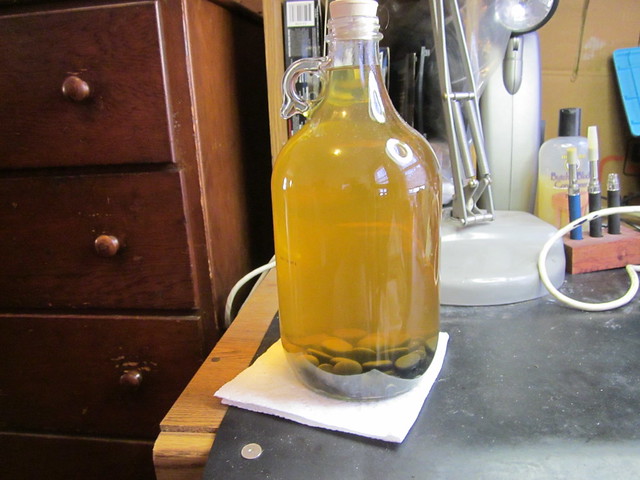So we all know that melomels can oxidize when exposed to too much oxygen. I have a couple that are in their second racking so there is a decent amount of head space in the carboy. Is there an accepted way to prevent oxidation? Fill the space with glass marbles? A campden every racking? Don't worry about it?
You are using an out of date browser. It may not display this or other websites correctly.
You should upgrade or use an alternative browser.
You should upgrade or use an alternative browser.
Best way to prevent melomel oxidation?
- Thread starter NyQuil
- Start date

Help Support Homebrew Talk - Beer, Wine, Mead, & Cider Brewing Discussion Forum:
This site may earn a commission from merchant affiliate
links, including eBay, Amazon, and others.
Vase filler glass "stones" - much cheaper than marbles.


theDREWery
Well-Known Member
Make some top off wines, like Welch's white grape. They're cheap and taste good on their own, but work well to fill the empty space.
fuelish
Well-Known Member
To my knowledge, have never had a batch of oxidised beer or mead, and I take no steps to "top off" .....or perhaps I HAVE had some oxidation and just happen to love the taste??? 
I have watched like 4 videos on tube where ppl make mead making tutorials and after all the steps they take to avoid oxynitation.  most of their oxyginaton actually happens during transferring. I do oxygenate heavily during the first 5-6 days via degassing with a drill bit. So I don't know what to say here.
most of their oxyginaton actually happens during transferring. I do oxygenate heavily during the first 5-6 days via degassing with a drill bit. So I don't know what to say here. 
Glass marbles are sold at every dolla sore.
Glass marbles are sold at every dolla sore.
Alchemymead
Active Member
- Joined
- Oct 5, 2015
- Messages
- 30
- Reaction score
- 4
To my knowledge, have never had a batch of oxidised beer or mead, and I take no steps to "top off" .....or perhaps I HAVE had some oxidation and just happen to love the taste???
I think this is also the case for mine, most of the time if I give mine a bit of a shake before pouring it tastes better! I don't know if this is a sign of not well made mead but I guess I don't care
I think this is also the case for mine, most of the time if I give mine a bit of a shake before pouring it tastes better! I don't know if this is a sign of not well made mead but I guess I don't care
There's a difference between letting wine "breathe" (pouring is often sufficient) before serving, and oxidation while in process... Unless you like that flavor of course, it is best to avoid situations resulting in oxidation. I don't always have top off fluids available, but I doo keep a can of nitrogen that I can use, I avoid moving fermenters around much and thereby sloshing gases into the wine or beer. Just some thoughts. The experienced forum members say the best practice is to not leave too much headspace.
Vase filler glass "stones" - much cheaper than marbles.

Those look like natural stones. Have you tested to see how they might effect PH?
Never mind I see you wrote that they are glass... Hopefully lead free glass.
Last edited:
To my knowledge, have never had a batch of oxidised beer or mead, and I take no steps to "top off" .....or perhaps I HAVE had some oxidation and just happen to love the taste???
My only experience with that is red wine - I have had wine that tastes really funky if it sat in an open bottle too long, especially in warm weather. It's very obvious.
Meads are less prone to spoiling, but ciders and fruit things (cysers and mels) are in the "susceptible" column. I haven't had one go bad either, but I don't take chances.
Then there's the risk of contamination. An infection needs 2 things to grow - bacteria and oxygen. Eliminate oxygen and no nasties can grow.
It's only long term (more than a few weeks) secondary where I worry about it though.
Similar threads
- Replies
- 6
- Views
- 1K
- Replies
- 3
- Views
- 2K

